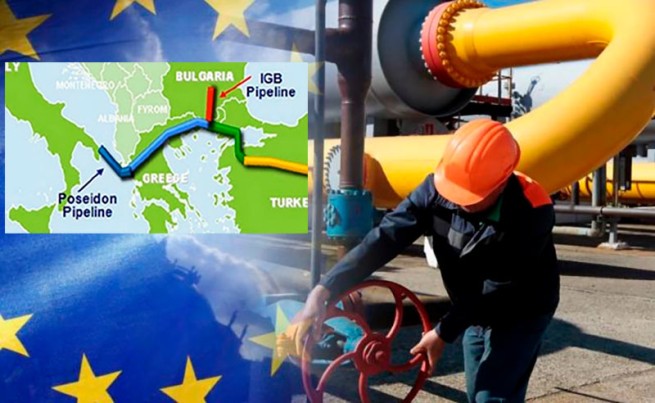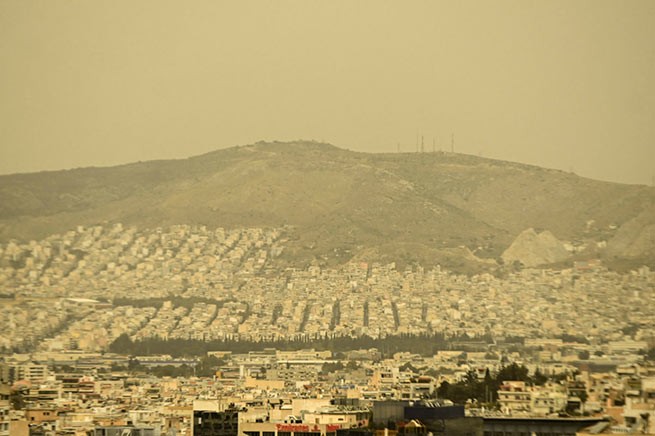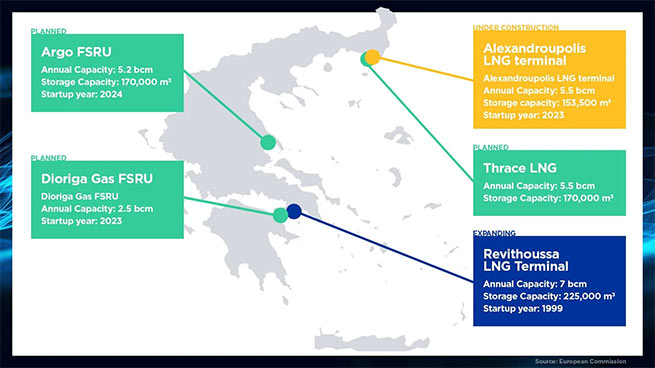Greece is becoming a European center for liquefied natural gas (LNG) as demand for it rises due to the war in Ukraine, Prime Minister Kyriakos Mitsotakis said at an international LNG conference held in Athens on Wednesday.
Mitsotakis spoke about the new infrastructures that have been implemented or are being built that allow increasing natural gas exports. Currently, major LNG projects – either under construction, expanding or planned – are taking place at five locations across Greece. Over the next two years, they could more than double the country’s ability to handle global LNG supplies.
Various projects – two near the city of Alexandroupolis in northern Greece, one near Volos in central Greece and two near Athens – are being implemented as Europe surges its LNG imports to replace Russian natural gas.
The European Union imported about 100 billion cubic meters of LNG this year, more than 60% more than a year ago and a record high, according to the European Commission. “The crisis is changing the energy map of Europe, and Greece is at the forefront of these changes,” Mitsotakis said at the conference. He noted that Greece also participates in the TAP pipeline, through which natural gas from Azerbaijan is transported to Europe, and in the Greece-Bulgaria gas pipelinewhich was opened recently.
“In a few years, we may have 2, 3 or even 4 floating LNG stations. We want to help our neighbors diversify their energy supplies and increase the stability associated with energy security,” he said. In conclusion, he noted that Europe, as Greece is already doing, must continue to explore hydrocarbon deposits in order to provide energy at a reasonable price without compromising the transition to a green economy. “We need innovative solutions to ensure energy security now without undermining the path to decarbonisation,” the prime minister concluded.

Revitussa – the only operating LPG terminal in Greece
Greece’s only operating LNG regasification and storage terminal on the islet of Revitus off the coast of Athens has played a key role in the country’s strategy to move away from Russian gas* and improve security of supply ahead of winter. The country has already cut Russian gas imports by more than half this year, thanks to an increase in supplies from other producers to the Revitussa terminal, which is 5 miles (40 km) from Athens, can store 225,000 cubic meters of gas and regasify 1,400 cubic meters per hour. New Floating Storage and Regasification Units (FSRU) in Greece are planned to be built in:
Alexandroupolis
Gastrade, owned by the Greek Kopelouzos family, is developing an FSRU that will anchor about 18 kilometers from the northern Greek port of Alexandroupolis and transport the gas to shore via a 28-kilometer pipeline. Once operational, it is expected to transport gas to Bulgaria and further north by the end of 2023. Gastrade said it is considering building a second FSRU vessel off the coast of Alexandroupolis.
Volos
Mediterranean Gas plans to build an FSRU in the port of Volos, in central Greece. The company has invited LNG producers, traders, large consumers, industrial users, and maritime and shipping companies to submit non-binding requests for capacity reservations by December 19. The plant, with an annual capacity of 5.2 billion cubic meters, will supply gas to North Macedonia, Bulgaria, Romania, Albania, Italy and other European countries. Commercial operation is scheduled for the second quarter of 2023.
Corinth
Dioriga Gas, a division of Greek refiner Motor Oil, plans to begin construction on an FSRU plant off the coast of Agioi Theodori, near Athens, in the fourth quarter of this year. It will hold up to 210,000 cubic meters of gas, which will either be regasified and exported through the Greek gas network or sold as LNG via ships and trucks.
Thessaloniki
Elpedison, a joint venture between the Italian company Edison and Helleniq Energy, wants to build an FSRU near the northern city of Thessaloniki, the second largest in Greece, by 2025. It will be able to store 170,000 cubic meters of gas and deliver up to 20 million cubic meters daily.
*Except that a large part of LNGreceived by Greece (about 50%) was Russian origin.







More Stories
Highway E65: how long does the Athens-Kalambaka journey take, toll
"Tax" for fire protection of real estate
The first non-state medical school in Greece